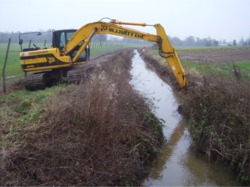Today’s announcement from Defra states that the department will be allowing farmers to dredge ‘ditches’ without seeking permission from the Environment Agency because they ‘know their land best’. This follows a series of pilot projects last year, the results of which failed to make the case for further deregulation of dredging (note 1).
In 2014 the Angling Trust, water engineers and wildlife groups expressed grave concern about any increase in wholesale dredging because the evidence from the Environment Agency shows that in many cases it simply increases the speed and volume of water heading into main rivers which will then flood more towns and cities. They commissioned a report from the Chartered Institute of Water and Environmental Management (CIWEM) entitled “Floods and Dredging – A Reality Check” which was presented as evidence to the Select Committee inquiry into the 2014 floods (note 2).
The Defra announcement goes on to say that investment in flood defences will protect a million acres of prime farmland from flooding. Once again, this proposal makes no sense; stopping rivers flooding fields upstream will only increase the discharge of water downstream where it will cause damaging flooding of homes and businesses.

The Angling Trust is writing to the Secretary of State calling on her to reconsider these proposals and to look not at how farmland can be protected from rivers, but how rivers can be better protected from unsustainable farming that is causing widespread soil erosion and massively increased levels of surface water run-off. Modern farming techniques using larger machinery, high stock densities and particularly the huge expansion of maize production (subsidised by tax payers to generate energy from anaerobic digesters) are responsible for depositing millions of tonnes of soil and billions of gallons of water into rivers every year, contributing to flooding and causing pollution of rivers and coastal waters with sediment, pathogens, pesticides and fertilisers. This increases the cost of treating water for public supply which drives up water bills.
The press release mentions ‘efficiency’ cuts to the Environment Agency and Natural England, which have already lost many expert staff over the past 8 years in a series of cuts. They have also been banned by Defra from developing policy, which means that the evidence-based approach promised by the government has been replace by policies driven by politicians who don’t understand basic hydrology. An EA report demonstrating that dredging does not reduce flooding was removed from all government web sites, but the Angling Trust is today re-publishing it in the interests of transparency (note 3).
Mark Lloyd, Chief Executive of the Angling Trust and Fish Legal, who is speaking at the Oxford Real Farming Conference on Thursday 7th of January said:
“Dredging to protect farmland was responsible for decimating wildlife in many rivers in the 1960s and 70s and it is unbelievable that the Secretary of State for the Environment is seeking to go back to those bad old days. It is scandalous that the Government has hidden from public view the advice of its own experts on the dangers of unregulated dredging and ignored the findings of the study into the pilot dredging projects.

“The evidence shows that the best way to reduce the risk of flooding is to manage land upstream to reduce the flow of water and soil off fields, rather than pouring more concrete into flood defences and dredging small streams. Furthermore, many ‘ditches’ are in fact important fish refuges and wildlife habitats; unregulated dredging could do great damage to these ecosystems and the economic benefits to rural communities arising from angling.”
Martin Salter, National Campaigns and Policy Coordinator for the Angling Trust, added:
“At a time when communities are mopping up after the floods which devastated the downstream areas of many river catchments it beggars belief that government ministers are even considering deregulating practices which their own experts have told them will move water downstream even faster. This is a policy that puts farmland above homes and they need to think again.”










